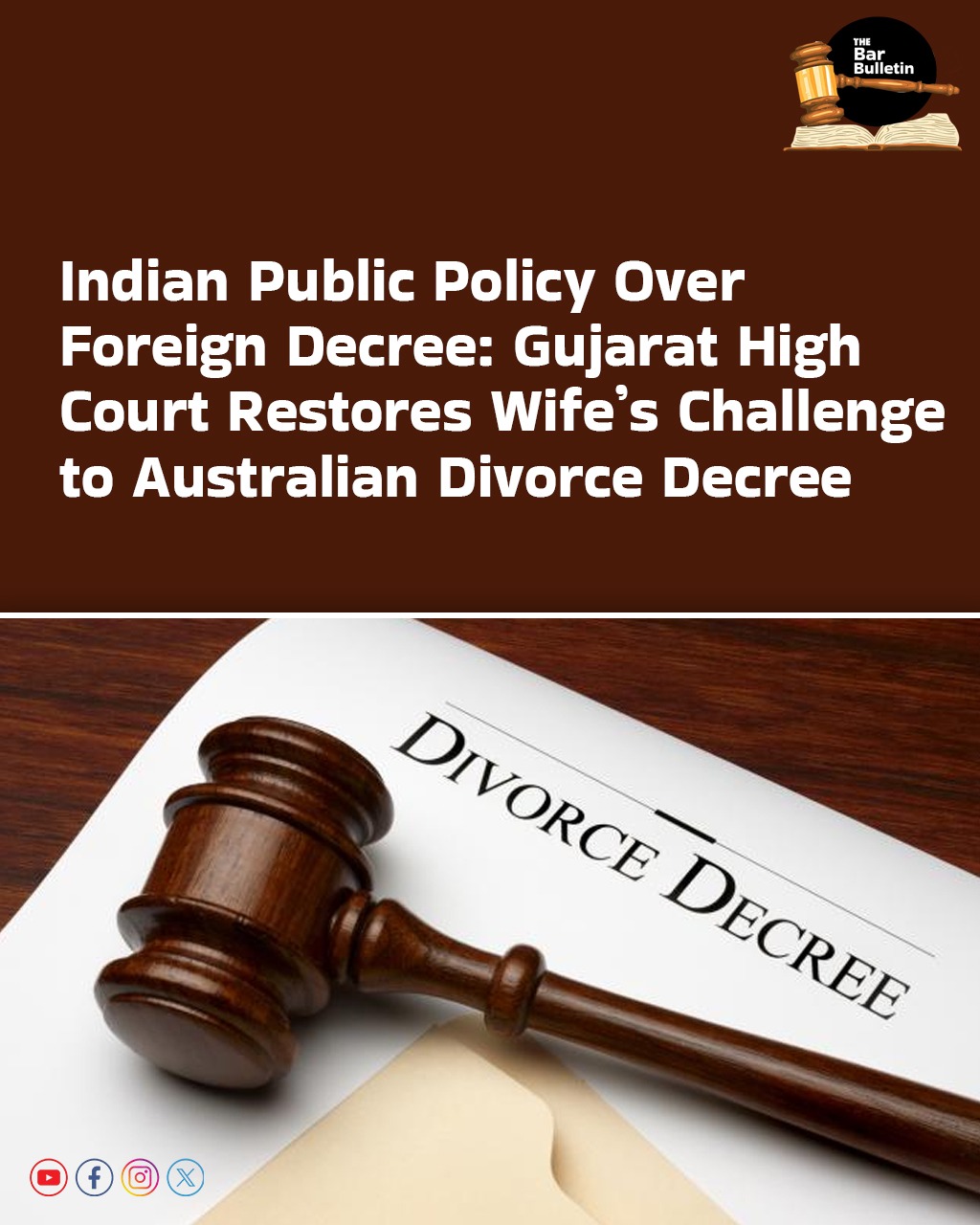The Gujarat High Court allowed the wife’s appeals, setting aside the Family Court’s rejection of her suits challenging the validity of an Australian divorce decree and seeking restitution of conjugal rights.
The appellant-wife had filed two appeals: one, challenging the order rejecting her suit to declare a divorce decree granted by an Australian court as null and void; two, challenging rejection of her separate suit for restitution of conjugal rights under the Hindu Marriage Act.
She claimed the Australian decree was invalid in India, arguing that only Indian courts have jurisdiction over dissolution of Hindu marriages solemnized in India.
The couple had married in Ahmedabad under Hindu rites in 2008, later moving to Australia. Both spouses acquired Overseas Citizenship of India (OCI) and, though they were Australian citizens, maintained legal and familial links to India. Marital discord surfaced in 2014, and the husband filed for divorce in Australia in March 2016. Consequently, the wife was served notice in India and she contested jurisdiction of the Australian court.
During and after the Australian proceedings, the wife initiated restitution, maintenance, and domestic violence actions in Indian courts. The Family Court at Ahmedabad rejected her suits under Order 7 Rule 11 CPC, citing lack of cause of action due to the Australian divorce, leading to these appeals.
The wife’s central argument was that the Hindu Marriage Act (HMA) exclusively governs the marital status and dissolution of marriages solemnized in India, regardless of later foreign citizenship or residence. She asserted that the Australian court lacked jurisdiction since both parties resided in India when the divorce suit was filed abroad.
The Bench comprising Justice A.Y. Kogje and Justice N.S. Sanjay Gowda examined the international private law principles and relevant Supreme Court rulings, notably Y. Narasimha Rao vs Venkata Lakshmi[1]. They found that Indian law governs Hindu marriages solemnized in India, irrespective of citizenship or residence changes.
They also noted that foreign divorces granted on grounds unavailable under the HMA (e.g., irretrievable breakdown) are not automatically valid in India unless parties voluntarily and unconditionally submit to the foreign court’s jurisdiction or the decision is on a ground recognized by Indian law.
The Court held that rejection of the wife’s suits by the Family Court was legally untenable, as the plaint clearly disclosed a cause of action, i.e., contesting the validity and jurisdiction of a foreign divorce decree under Indian law. As per Section 13 CPC, Indian courts need not recognize a foreign judgment if it is contrary to Indian law or given without jurisdiction. The Bench concluded that the Family Court’s reliance on citizenship and foreign forum was misplaced.
The Court held that Family Courts in India have exclusive jurisdiction to rule on the validity and status of marriages solemnized under the HMA, including challenges to foreign court decrees. The acquisition of foreign citizenship by parties does not oust Indian courts’ authority over a Hindu marriage conducted in India.
In result, the High Court set aside the Family Court’s orders and restored the wife’s suits. The Family Court was directed to adjudicate her suits for restitution of conjugal rights and for declaration that the foreign divorce decree was null and void, on their merits and in accordance with law.
The Court clarified that the determination of marital status for Hindu marriages must always comply with the HMA, reinforcing Indian public policy over foreign decrees where the HMA applies. The order was stayed for two weeks on the respondent-husband’s request.
Cases relied on:
1. Narasimha Rao and Ors. vs Y. Venkata Lakshmi and Ors. (1991) 3 SCC 451
2. Balram Yadav vs Fulmaniya Yadav (2016) 13 SCC 308
3. Dinesh Singh vs Sonal Thakur (2018) 17 SCC 12
Appearances:
For the Appellant: Aaditya D Bhatt, Chandni S Joshi, Advs.
For the Respondent: Kshitij M Amin, Rahul R Dholakia, Advs.
[1] (1991) 3 SCC 451

